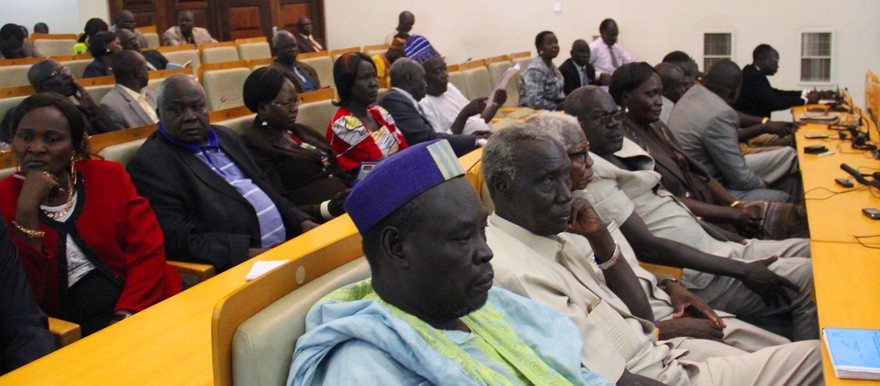A parliamentary rule known as ‘quorum’ has become politically significant in South Sudan after repeated attempts by supporters of President Salva Kiir to pass the National Security Service Act 2014.
The Oxford English Dictionary defines quorum as “The minimum number of members of an assembly or society that must be present at any of its meetings to make the proceedings of that meeting valid.”
Quorum comes from the Latin word meaning ‘of whom’ – as in, “the parliament has 309 members, of whom 87 were present for the vote.”
South Sudan’s constitution requires that the national parliament abide by the rule of quorum. Article 54 (3) states, “Vote count shall… governed by the quorum specified in this Constitution.”
According to Article 74 of the constitution, more than 50% of the members of parliament must be present for the final vote on bills. The same article also says that if a quorum is reached, then the bill must be approved by a majority of votes.
This means that there are two ways to defeat a bill in parliament:
(1) A quorum is reached, but a majority of those present vote against the bill;
(2) A majority of those present vote for the bill, but a quorum was never reached.
Number of parliament members
South Sudan’s parliament has 332 seats but 23 members were removed in August on grounds of absenteeism and suspicion of ties to the opposition groups SPLM-IO and SPLM-FD (SPLM-G10). This means that a quorum of at least 155 members is necessary for any final vote on new legislation.
However, several MPs have argued that their removal from parliament was illegitimate, and therefore that the total number of members is higher, which would also make the quorum higher.
Vote on the National Security Service Act
Supporters of the SPLM-Juba faction leader Salva Kiir, whose caucus controls the parliament, sought to pass the national security bill last October.
The bill gave the security service powers to make warrantless arrests and to detain people without informing their family or lawyer. The bill also required officers to swear an oath of loyalty before Kiir himself.
MPs gathered on 7 October to deliberate the bill but failed to reach quorum and therefore adjourned the sitting. The SPLM-Juba parliamentary leadership made another attempt to reach quorum on 8 October.
A vote on the bill was taken as an oral motion whilst a large bloc of ruling party MPs boycotted the sitting, including most members from the Equatoria region. All of those present reportedly voted in favor of the motion and the bill was passed unanimously.
Nonetheless, the outcome of the parliamentary session is contested on the basis of quorum.
During the opening of the session at about 1:00 p.m., Speaker Manasseh Magok Rhundial claimed that 165 MPs were present. He repeated this claim in a later interview, saying 165 MPs were “physically present.”
On the other hand, MP Henry Odwar said that the number of MPs registered at the start of the session was 87, but after some MPs walked out the number was “less than 60.”
Political factors
Some members of the ruling party who voted in favor of the security bill nonetheless have worried that the issue has divided the party along regional lines. They saw the issue not merely as a matter of legality, but also one of party unity.
During the final debate on the bill on 8 October, MPs Rose Adau Deng (SPLM-Juba, Twic County) and MP Deborah Ajok Garang (SPLM-Juba, Pariang County) raised a concern that the bill would govern all South Sudanese yet members of the Equatorian bloc were boycotting the sitting.
Other members of SPLM-Juba dismissed this concern and pushed forward with the vote. They claim that the bill passed while a quorum of MPs were present.
In spite of this, President Salva Kiir has decided not to sign the bill and to withhold his assent until further consultation with his lawyers, the presidential spokesman said on 26 November.
Kiir’s spokesman hinted that the president may return the bill to parliament, but he attributed the cause to criticisms on the substance of the bill rather than the controversy over quorum.
File photo
Related:
Kiir to try again to pass his security bill (27 Nov.)




